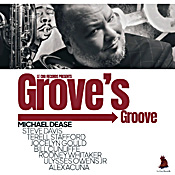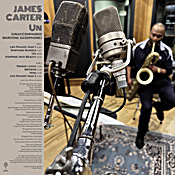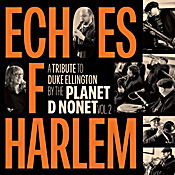Recent Recording by Area Artists
This month’s new recordings feature the baritone saxophone, an instrument that has sometimes been needlessly maligned, as reviews and biographies of its practitioners so often include the lazy cliché, “cumbersome,” which is simply wrong as it is not any harder to play than any other saxophone, perhaps just more of a bother to transport. Suddenly, it appears that Michigan is becoming the bari capitol of the planet, peopled by such luminaries as James Carter, Alex Harding, Kaleigh Wilder, Goode Wyche III, and now Michael Dease.

Michael Dease, professor of jazz trombone at Michigan State University, has easily risen to the top of his profession, once again topping the Downbeat critic’s poll on his instrument. But Dease is an enthusiastic muti-instrumentalist, who came to his main axe relatively late, first playing trumpet and saxophone, and is also proficient on piano and bass. In recent years he has been performing on baritone sax and Grove’s Groove (Le Coq Records) is the second album after last year’s Swing Low on which he plays on it exclusively. This time his band consists of Steve Davis, trombone, Joselyn Gould, guitar and voice, Bill Cunliffe, piano, Rodney Whitaker, bass, and Ulysses Owens Jr., drums, with trumpeter Terrell Stafford, percussionist Alex Acuña, organist Jim Alfredson, and trombonist Eli Howell added on a few tunes. Their common connection is jazz education, and all save Cunliffe and Gould share an association with the late trumpeter Roy Hargrove, to whom the album is dedicated.
The recital opens with the title tune, a 13-bar minor blues from the pen of Steve Davis that Dease had recorded almost a decade ago, playing trombone of course, on his Decisions album. The laid-back composition takes us back in atmosphere to the classic years of Art Blakey’s Jazz Messengers, so it is apposite that the composer, who is the only person on the recording who actually played in the final edition of that classic formation, is on board here. This first cut signals the general tone of what is to come, laying claim to hard boppish territory but also introducing the band as everyone save the drummer takes a short solo. Dease is generous with solo assignments throughout, but his baritone is definitely in focus here, and he sets down his marker to be a serious contender for future polls on this horn as well. He has his own way with the instrument, fast and punchy, with a unique sound that is slightly softer than the Pepper Adams groove many now work in, but no less biting and expressive. There are moments when his attack and phrasing seem to reflect his trombone practice, giving his bari work a unique flavor. The delicate expressive phrasing and tonal palate of his playing is in full display on the one slow ballad, “Never Let Me Go,” one of two vocal features for Joselyn Gould, who impresses with an unaffected wistful approach somewhat in the manner of June Christie. The nine tunes on the album cover a wide range of tempos and moods, from ballads to up-tempo straight-ahead romps, and even a boogaloo tune in the Blue Note mode (Charles McPherson’s “The Viper”). Those who enjoy mainstream modern jazz will find much to enjoy here, with fine soloing, imaginative arrangements and well-paced collection of tunes.

Multi-instrumentalist James Carter is celebrated for his tenor and soprano saxophone prowess, but as many know, he is just as accomplished on all the saxophones, from soprano to the bass, the clarinets, and flutes; indeed, the first time I saw him play in person he was blowing down the Kerrytown Concert House on the contrabass clarinet in Wendell Harrison’s clarinet ensemble. Carter has a hunger for jazz history and his many different ensembles reflect his archaeological research. His recent work has explored such areas as the music of Django Reinhardt, electronic funk, or the classic organ trio. None of this has prepared us for his audacious LP Un (Unaccompanied Baritone Saxophone) on J.M.I. That Carter would focus on the bari is hardly a surprise for listeners in the Detroit area because we have heard him soar on the big horn often, but one suspects that the difficulties of airline travel with larger instruments have prevented him from using it as often in his journeys. Be that as it may, last year he sat down all alone in a studio in New York and recorded eight tunes, six of them his own, and one each by Faye Washington (“Life Phases”) and David Murray (“Ming”). Few have ventured to record solo baritone sax albums, but the small company is a prodigious one, as one thinks of David Mott’s The Sky Ringing in an Empty Bell or Hamiet Bluiett’s Birthright. Carter is an extravert with a dazzling instrumental technique that can sometimes seem overwhelming, but the solo format brings out the best of him, forcing him to pace himself and choose his battles carefully. Here he uses his seemingly inexhaustible bag of techniques in check, dispensing them carefully over the whole recital. He can shade notes in every possible expressive manner, find new ways of articulating them, and can give an illusion of layering them by using circular breathing so that he can play endlessly without interruption. Sometimes he is out of tempo, and sometimes he swings as if playing on top of a groovy rhythm section, but he has no need for one as his propulsive sense of pulse just simply swings. He plays inside, bluesy or boppy, goes out, covering the whole range of the instrument from rumbling bottom to stratospheric altissimo with disarming ease. He can coo or scream, sing out with a plaintive vibrato, creating a range of moods, his deep sound at times invoking Harry Carney, the father of the horn in jazz, while remaining steadfastly modern. The instrumental virtuosity, compositional variety and controlled passion that permeates this recording makes it one that I will return to again and again.

Planet D Nonet, co-led by James O’Donnell and RJ Spangler, have just released volume two of their salute to Duke Ellington, entitled Echoes of Harlem (Eastlawn ELD-42) following up on last year’s Blues to be There, which garnered very favorable national press and radio play. While promoting their CD in concert, they kept adding charts, eventually collecting enough for this second installment of their homage to the Duke. The challenges of such a project are obvious: a nonet cannot easily invoke the same power and color palate of an orchestra of seventeen or more players, the technical and musicological demands on instrumentalists have changed, and, most important, each member of the original band had a unique sound. Therefore, horn sections sounded like no other, and Ellington and Billy Strayhorn wrote solo passages with specific individuals in mind. As a result, most modern imitations are simply absurd: either people play the original arrangements as they would any other or have each member of an orchestra study and imitate the tonal qualities and inflections of their long-departed predecessors. Planet D has successfully approached the matter in a tempered manner, having Jeff Cuny cleverly rearrange the charts to fit a band that has only one trombone rather than three or four, including a valve trombone and sometimes a bass one, and two trumpets instead of four or five. Indeed, there are wonderful moments here where one could swear that a full-fledged big band is playing. On this CD the Nonet consists of Alex Colista, alto sax, clarinet, Christopher Tabaczynski, tenor saxophone, clarinet, Goode Wyche III, baritone & also saxophone, James O’Donnell, trumpet, flügelhorn, Charlie Miller, trumpet & flügelhorn, John “Tbone” Paxton, trombone, vocals, Michael Zaporski, piano, Trevor Lamb, string bass, Sean Perlmutter, drums & cowbell, RJ Spangler, congas, small percussion, with Kurt Krahnke, bass, on two numbers, and Camille Price singing “Rocks in My Bed.”
The Ellington band played almost nightly, which would be impossible today, and few of the solos were completely improvised. After new pieces were introduced, many would then continue to play a version of their original solo for years, some even wrote them out, and as a result the section and solo elements organically blended into compositions, although Ellington and Strayhorn reworked them continually for years on end. In this spirit, Planet D has maintained the solo sections of through composed pieces such as the title tune, written for the trumpet of Cootie Williams or “Blood Count,” a feature for the alto saxophone of Johnny Hodges. James O’Donnell and Alex Colista take on the respective challenges by playing all the right notes, invoking the original performers but refraining from complete imitation. On “Juniflip,” however, originally a feature for Clark Terry’s flügelhorn, Miller improvises his own eloquent statement, with only an occasional tip of the hat to Terry, followed by equally impressive original solos by Colista, who now does not try to invoke Hodges, and the imposing baritone sax of Goode Wyche III. The latter likewise has to play a delicate dance here, utilizing certain aspects of Harry Carney’s deep rich sound that so characterized the sound of the saxophone section, again without falling into the imitation trap. This he does admirably, and his work throughout is one of the standouts of the recital so that the CD fits well into the baritone masters theme of this review. For example, on “La Belle Plus Africaine” he takes a long passionate outing that invokes Carney but is decidedly modern, paying homage to the first great innovator of the bari. This track is one of the highlights of this installment of the homage. The composition, written in 1966 for The First World Festival of Negro Arts in Dakar, Senegal, became a staple of the band’s repertoire in subsequent years, was always played with potent gusto and it amazes how Planet D can match this power with their smaller numbers.
There are many wonderful moments on this recording, with very fine solos by almost all members of the band, a wide variety of approaches to the material, from a well-crafted adaptation of an original chart in the archives of the National Museum of American History of the Smithsonian Institution (“Rocks in My Bed”) to a head arrangement (“Caravan”), and while this is a studio recording there is a vitality here that is no different from the pure joy of making music that is so characteristic of Planet D live performances. The choice of compositions is well-crafted, avoiding the usual well-tread hits, digging into the vast treasure house of Ellington works. This is no “worthy follow-up,” but a marvelous statement of love for the Duke, Billy Strayhorn, and the masters who worked with them.